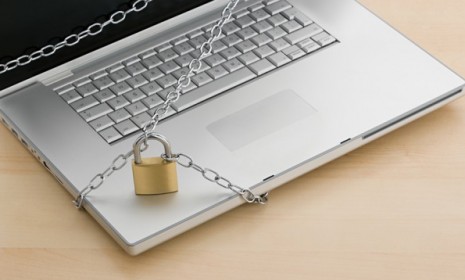Obama's proposal to 'wiretap' the internet
The president reportedly wants to expand the government's online surveillance powers. Does anyone think that's a good idea?

A free daily email with the biggest news stories of the day – and the best features from TheWeek.com
You are now subscribed
Your newsletter sign-up was successful
Federal law enforcement and national security officials are seeking new regulations that would force almost all electronic communications services to decode any messages if served with a wiretap warrant, The New York Times reports. The FBI and other agencies are concerned that as more people ditch the telephone for encrypted email, BlackBerrys, and peer-to-peer networks like Skype, their ability to eavesdrop on criminals and terrorists is "going dark." But is mandating a "back door" to all e-communications really the best solution?
So much for privacy rights: There was a big stink when "tyrannical" Arab government kicked out BlackBerry for not letting them monitor all messages, says Glenn Greenwald in Salon. Well, the Obama administration is now "taking exactly the position of the UAE and the Saudis." If these proposals are enacted, law-abiding Americans will no longer enjoy any vestiges of "true privacy from government authorities."
"The Obama administration's war on privacy"
The Week
Escape your echo chamber. Get the facts behind the news, plus analysis from multiple perspectives.

Sign up for The Week's Free Newsletters
From our morning news briefing to a weekly Good News Newsletter, get the best of The Week delivered directly to your inbox.
From our morning news briefing to a weekly Good News Newsletter, get the best of The Week delivered directly to your inbox.
Obama has tough choices: "My hunch is that Obama could make an excellent argument against" the new privacy-sapping proposals, says Michael Crowley in Time, "and that it pains him to adopt them." But at this point he would probably "rather be accused of limiting civil liberties than of having been less than fully vigilant" if there were a terrorist attack. And his critics don't receive Obama's "constant and chilling" intelligence briefings.
The "back door" won't work: Even if the new wiretap regulations are constitutional — and they may not be, says Declan McCullough in CNET News, they're impractical, will not do much to stop criminals from chatting privately, and give hackers and foreign governments easier access to our emails, too. Also, the rules are largely unnecessary: The feds, right now, can physically tap suspects' computers with a warrant.
"Report: Feds to push for Net encryption backdoors"
A free daily email with the biggest news stories of the day – and the best features from TheWeek.com
-
 5 cinematic cartoons about Bezos betting big on 'Melania'
5 cinematic cartoons about Bezos betting big on 'Melania'Cartoons Artists take on a girlboss, a fetching newspaper, and more
-
 The fall of the generals: China’s military purge
The fall of the generals: China’s military purgeIn the Spotlight Xi Jinping’s extraordinary removal of senior general proves that no-one is safe from anti-corruption drive that has investigated millions
-
 Why the Gorton and Denton by-election is a ‘Frankenstein’s monster’
Why the Gorton and Denton by-election is a ‘Frankenstein’s monster’Talking Point Reform and the Greens have the Labour seat in their sights, but the constituency’s complex demographics make messaging tricky
-
 The billionaires’ wealth tax: a catastrophe for California?
The billionaires’ wealth tax: a catastrophe for California?Talking Point Peter Thiel and Larry Page preparing to change state residency
-
 Bari Weiss’ ‘60 Minutes’ scandal is about more than one report
Bari Weiss’ ‘60 Minutes’ scandal is about more than one reportIN THE SPOTLIGHT By blocking an approved segment on a controversial prison holding US deportees in El Salvador, the editor-in-chief of CBS News has become the main story
-
 Has Zohran Mamdani shown the Democrats how to win again?
Has Zohran Mamdani shown the Democrats how to win again?Today’s Big Question New York City mayoral election touted as victory for left-wing populists but moderate centrist wins elsewhere present more complex path for Democratic Party
-
 Millions turn out for anti-Trump ‘No Kings’ rallies
Millions turn out for anti-Trump ‘No Kings’ ralliesSpeed Read An estimated 7 million people participated, 2 million more than at the first ‘No Kings’ protest in June
-
 Ghislaine Maxwell: angling for a Trump pardon
Ghislaine Maxwell: angling for a Trump pardonTalking Point Convicted sex trafficker's testimony could shed new light on president's links to Jeffrey Epstein
-
 The last words and final moments of 40 presidents
The last words and final moments of 40 presidentsThe Explainer Some are eloquent quotes worthy of the holders of the highest office in the nation, and others... aren't
-
 The JFK files: the truth at last?
The JFK files: the truth at last?In The Spotlight More than 64,000 previously classified documents relating the 1963 assassination of John F. Kennedy have been released by the Trump administration
-
 'Seriously, not literally': how should the world take Donald Trump?
'Seriously, not literally': how should the world take Donald Trump?Today's big question White House rhetoric and reality look likely to become increasingly blurred